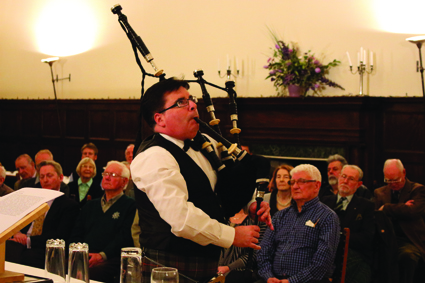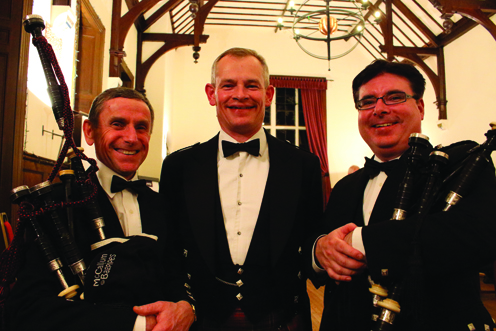 We conclude the lecture give by Jonathan Gillespie at the Birnam Hotel, Perthshire, last March, organised by the College of Piping.
We conclude the lecture give by Jonathan Gillespie at the Birnam Hotel, Perthshire, last March, organised by the College of Piping.
James must once have been a fine player – even in his eighties he had a crispness of fingering on the chanter that would be the envy of many half his age. It is good that recordings of James’ playing are now available on the Piobaireachd Society website. To hear him play the first line of what he told me was ‘probably’ his favourite tune, Lament for the Earl of Antrim, was to be shown something of rare beauty – the hiharin with the correct emphasis on the low A, the semi-broken double echoes of bars 1 and 2 leading to the high A contrasting with the full double echo of bar 3.
This leads me to introduce our third tune this evening, for which we welcome back Euan MacCrimmon. Others will no doubt have heard James speak of other tunes as among his favourites, but on the basis of what he said to me on more than one occasion, I thought it right that the Lament for the Earl of Antrim should be played this evening. To ensure his pipe is fully settled before starting this big tune Euan will begin with the Retreat March Major James Campbell of Kilberry MC by George McIntyre.
James’ later years
In his later years at the big competitions James would naturally
gravitate towards the junior events, preferring the opportunity to hear the promising young players which he saw as more of a visit to the unknown, affording an opportunity to get tabs on instructors who he considered to be worthy of the highest praise for their work. James wrote: ‘It is an exhilarating experience to witness the way in which the competitors in these contests have responded to instruction in the orthodox presentation of the music.’ He did, however, use his interview in The Voice to draw to the attention of the instructors to a couple of important points. One concerned the pre-cadence pause in crunluath singlings. James drew attention to the 1911 Cameron teaching on the subject to be found in the Side Lights on the Kilberry Book, there being a temptation to extend this pre-cadence pause to the taorluath variation which was at one time detectable in the playing of John MacDonald. James recorded that John MacDonald was later firm in his denial of the propriety of making any such a pause either in crunluath or taorluath singlings, a denial recorded by Sheriff Grant in his notebook of 1949. James was keen for instructors to be aware of this conflict of authority and in a position to answer questions or offer advice. In his teaching of me, James was clear in his preference for a pre-cadence pause in the crunluath singling and also of the unacceptability of such a pause in the taorluath singling.
James also comments interestingly on the timing of the hiharin movement. He writes: ‘You do not have to go along with everything that has been written on this subject to accept that ordinarily the final A should be longer than the cadence E – maybe not by very much and to a greater or lesser degree according to context. For instance, a mature player might well give less to the A in bar 1 of Lament for Donald Ban MacCrimmon than he would give to the A in bar 1 of Lament for the Earl of Antrim. Students often try to learn from books and the books in current use print the E and the A as even crotchets. Intention to instruct beginners is firmly disclaimed in the Introductions but students do not read Introductions and some are in need of help in achieving flexibility on the handing of the hiharin movement.‘
When my work brought me to Scotland in the late 1990s, we kept in touch regularly by post. I would send James recordings of piping programmes on the radio (he was, he wrote to me in December 2001, ‘much out of touch these days and the tapes which you send are of great value in keeping me informed of what is going on’) and he would respond with his comments – always frank, pithy and not always complimentary of the player’s interpretation. In this he would give little respect to reputation – a poor tune was just that whoever played it, a good tune likewise. Just occasionally he would write that a particular tune had merited inclusion in his library of special performances – that really was the sign of approval.

Angus MacColl was one to receive praise in this way, James commenting in the year 2000 that his tune (Sutherland’s Gathering, I believe) ‘really had all the virtues which one looks for in a high-class competition’. Jack Lee with The Laird of Anapool’s Lament and Greg Wilson (The Phantom Piper) also received this accolade.
On another occasion praise was recorded of the playing of the Nameless Tune from the McArthur Manuscript which James said had served to soothe him after hearing the same player murder Willie Murray – ‘a perfect illustration’, James wrote, ‘of how not to play a competition reel!’
Donald MacPhee’s playing of the same Nameless tune merited inclusion in James’ special library of recordings, this because of Donald’s rendering of the tune which purported to follow the exact writing which appears in the manuscript and unlikely to be heard again. James said that he himself had only played the edited version ‘which Archie Kenneth concocted’. In September 2002 James wrote that he had not gone to Oban that year but had enjoyed the recordings of Iain Speirs’ King’s Taxes and Willie McCallum’s Lament for Airds – both tunes were forthwith absorbed into his collection of first-class performances.

Elsewhere another top player is criticised for being ‘insufficient in the marking of his phrases in the ground and thumb’, and Bill Livingstone is praised for his rendering of Praise of Marion which James said ‘reminded me of John Wilson from whom I imagine that Livingstone learnt the tune in Canada’.
In his letters to me James did not limit his critique to playing but also commented on published interviews. Of one piping authority (better that he remain nameless, I feel) James wrote: ‘He seems to be quite happy to expound on a much wider selection of subjects that I would ever contemplate committing myself on.’
In what proved to be his final letter to me of 31 October 2003 James was still on sparkling form. Commenting on the playing of double echoes in the ‘George Moss’ style in the Clasp at Inverness that year he wrote: ‘I find myself in agreement with the trenchant remarks on this subject of Robert Wallace in The Piping Times of October. The judges are placed in an impossible position when freedom is accorded to deviate from the normal style of playing ‘beat’ movements.” He went on to comment about players who ignored the warning given in the advert about misprints in the Piobaireachd Society book, this relating to the Salute to Sir James Macdonald of the Isles. James continues: ‘These misprints are not easily detectable other than by comparison with Angus MacKay’s book, and the tune is quite unsuited to be set until the errors are corrected. Again, the judges were put on the spot.’
A couple of months before that letter he had written lauding Donald Macpherson’s recording of the Big Spree which I think must be that which appeared on his 2004 CD ‘A Living Legend’. James wrote that Donald was: ‘Really something of a marvel at the age of 86. I have always thought that the older you get, the better piobaireachd player you become, as long as the fingers last, which most of the time they do not. What is so amazing about Donald is that his execution is as good as ever.’
My final topic before our fourth piobaireachd of the evening which will precede my concluding remarks, are James’ insightful views about the importance, and limitations, of old manuscripts. In a letter to me in October 2001 James expresses his concern about the apparent inability to distinguish between the way tunes were written and that way in which they are played: ‘The old manuscripts date from the days when published scores were less available than they later became, and a common practice of pipers was to collect scores from unpublished sources without bothering to edit them to conform to their own ideas on the subject of presentation. The resulting record was for their own use as an aide memoire and was certainly not for use as a means of instructing in the art of playing. That art had been, or was being, acquired by face to face instruction and to this day such instruction is the ideal for the acquisition of the nuances and shading of piobaireachd playing. It is quite impossible to convey these subtleties in staff notation, and it is a common failing to imagine that the old books etc can be effective in conveying with any certainty the writer’s style of playing.’ James continues: ‘We are invited to accept that so-and-so ‘times’ a particular ground or variation in such-and-such a way. It may be that at some time there were styles of playing which differed from what is heard today. What is heard today is the style which was channelled through John MacKay, and other styles (if they existed) have not survived. This may be a matter for regret, but any attempt to advance theories about alternative styles can only be based on an individual reading of the old writings. The old writings are valuable for the preservation of old settings (i.e. the bones of a tune, its structure, the number and nature of its variations). An example heard at Inverness was Bill Livingstone’s adoption of the Donald Macdonald setting of John Garve, but note that the tune was played in the ‘MacKay’ style, and not in any supposed style indicated by the way in which it was written.
In similar vein James said this at the Piobaireachd Society conference in 1986: ‘John MacDonald had his own ideas of course and I think there may well have been a certain pique in him to find that the scores of the Piobaireachd Society are in some way ex cathedra direction as to how the tunes should be played. You cannot get that out of people’s heads, and that was particularly so in the case of John MacDonald who competed in the days when you jolly well had to play as per the Piobaireachd Society books. It wasn’t easy for him to see that … an editor can only choose one style to print as his main setting … and refer in the notes to other styles. It is a temptation which persists to see the printed score as a directive.’
This accords with James’ conclusion to the aforementioned article on The Elusive Appoggiatura (June 1988): ‘A literal reading of Donald Macdonald’s depiction of these movements could found a belief that he aimed to record a style of playing alternative to and different from that which has reached us through traditional teaching. But the lack of the link of traditional teaching with any such alternative style could go to sustain any who are inclined to share Dr Bannatyne’s contrary belief.’
And so to our final tune of the evening, chosen to mark our subject matter but also James’ close connection with its composer, his cousin Archie Kenneth, with whom he collaborated on several books of the Piobaireachd Society collection but whose work James was anxious to promote above his own contribution. I may be biased but I think this a very fine tune indeed and like a few other modern compositions worthy of more frequent airing. So here is Dr Jack Taylor to play Salute to James Campbell preceded by a Retreat March, The 8th Argylls by William Lawrie. [This tune can be heard on the CoP Radio broadcast of August 2014].
Conclusion
James died in Oban on 6 December 2003 having left Cambridge for the final time in June that year. With him disappeared our final link with founding fathers of the Piobaireachd Society. James was an erudite, modest and private man – a real gentleman – whom I was hugely privileged to know as a teacher, guide and friend for the last two decades of his life, a life which touched so many, pipers being only one part of his sphere of influence. Piping was a hobby he loved; the law and the teaching of the law was the profession he loved, but he was also a great teacher through his hobby as well as his profession.
Part of James’ obituary in The Times reads: ‘Piper, soldier, lawyer, don: an unusual man in the microcosms of academe. Astute, accurate, unsentimental, extraordinarily effective, with a superbly retentive memory, shrewd judgement of form and skill, an instinct for tidiness, and the most efficient sort of kindness by stealth: ‘the sweetest modest man’, an early pupil of his, then Lord Chief Justice, said seven years ago at a gathering in Cambridge indirectly in his honour.’
It was the same Lord Chief Justice, I believe, who wrote further of James: ‘We loved him. A modest man, he could not be drawn on how he had won his MC, saying simply he had forgotten or that it came with the rations. Friendship is a great art and very few are born with a natural gift for it. To James it was given in abundance.’ Many in the piping world will attest to that.

James was arguably the last great amateur academic patrician of our art. In his interview for The Voice he gave a very good explanation of the difference between an amateur and a professional in the piping world of sixty years ago which time does permit to include now. James was certainly the product of a very different age; we should judge him, and indeed his father, by the standards and modus operandi of their age rather than of ours. What is clear to me, and I believe to many others, is that our knowledge of piobaireachd would be much the poorer today were it not for the rich depth of the Kilberry legacy to us. An Old-Harrovian Cambridge-Don piobaireachd amateur may be only slightly more politically acceptable in our devolutionary or independently-minded times than an Old Etonian Prime Minister of the United Kingdom, but do not let that distract from a very important source of information about, and insights into, our great music. If you are any doubt – and even if you are not! – do re-read the prefaces to the Kilberry Book and to James’ Side Lights.
In his editorial in the latest Piping Times Robert [Wallace] refers to the hurt caused to James by offensive comments about his family. This is detectable in, and between, the lines of James’ letters to me, but I have decided, in accordance with the knowledge that James withdrew an article he had submitted for publication in response to some of the unjust comments, that it would not be appropriate for me to quote from personal correspondence in this regard. James’ retraction of his response before the publication deadline is, I believe, typical of the man who is on record as saying: ‘I am myself reluctant to give any appearance of thrusting my opinions down the throats of others.’ If only other members of the piping fraternity would be similarly reticent! Many of us know the truth behind James’ subsequent and very modest statement that: ‘I have always been receptive to enquiries’. There are collections of letters from James in the homes of pipers across the world who sought advice and guidance from him. He must have written an extraordinary number of letters.
In January 2004 Robert Wallace commented on James’ touching filial piety writing: ‘Nevertheless at no time did James adopt a defence or prosecution based on emotion or some skewed idea that he must, at all cost, defend the family reputation. As you would expect from a barrister and expert in law, his was a case meticulously prepared, measured, logical and powerful in its understatement. He was a master of his brief, his lucid explanations of piobaireachd’s complex minutiae a tutorial for all who have designs on putting pen to paper on this subject. There was never any hectoring bombast, no hint of the didactic. His work oozed calm and reasoned authority.’ And if you want an example of oozed calm and reasoned authority James’ ‘Elusive Appoggiatura’ article is an example of his work at its very best.
Before I finish may I express very grateful thanks on all our behalves to Euan and to Jack for their masterful playing this evening and to everyone at the College of Piping for organising this event.
My conclusion comes from a letter to me from James in November 2000. It has all the more resonance given knowledge of the detail of his life. He wrote: ‘At any rate the piobaireachd is a wonderful hobby to pursue, both in the playing and in the ‘academic side’. Also it is a solace both in adversity and in old age. So keep it up!
Keep it up, I certainly shall; I’m sure we all will.















